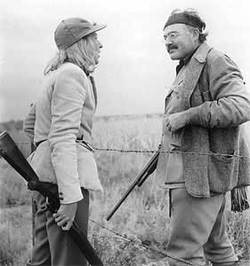|
Photo by Debra Lopez
|
|
By William Cane http://www.hiwrite.com/pub.html  A Writer's Strategy. If you have an idea for a book-length work of nonfiction there's no point writing the book first and then trying to get it published. If you complete the manuscript first, you'll probably wind up self-publishing rather than getting a publisher interested. The way professionals get their nonfiction books published is to use a three-part strategy. While it's possible to try other methods, most beginning and professional writers use this strategy because it works. I've outlined the three parts of the strategy here, and if you follow this advice you're likely to save yourself years of work. Your first step is to write a book proposal. This outlines your idea for the book, talks about its potential market, and gives a brief pitch on why you're the person to write this particular book. The book proposal should also contain one or two sample chapters. The reason you write a book proposal instead of the entire manuscript is that submitting a book proposal gives an editor time to give you some direction, should he wish to do so, at an early stage of the project. A book proposal is also something an acquiring editor can use to sell the book idea to the sales and marketing force. Bottom line: don't sell the book, sell the proposal. Your second step is to query a literary agent. Though some writers don't use agents, most beginning and professional writers do. (For example, Michael Chrichton, Tom Wolfe, and Bill Clinton all use literary agents to sell their writing. Even J.D. Salinger, who hated the publishing world, used an agent when he was publishing.) An agent can usually obtain a higher advance and better contract terms than you would be able to negotiate for yourself. Agents also have many connections and know many editors, so they can get your work in front of the right editors at the right publishing houses. The query to your agent should be perfect in every way. It should contains a brief summary of your book as well as a paragraph listing your credits and relevant prior publications, if any. The query should also ask whether the agent would like to see your book proposal. No more, no less. One thing making your life easier today is that most agents now accept email queries. Your third step is to select the agents you wish to query. This is just as important as the previous two steps because if you select the wrong agents they'll reject you even before they finish reading your query. Keep in mind that some agents specialize in cookbooks, others in political books, still others in medical or self-help titles. Selecting a group of agents to query from the more than 600 agents available can seem like a daunting task, but it's worth your while to take the time to do it right. By following this strategy — writing a book proposal and query and selecting a group of agents — you'll have a significant advantage over others who are trying to get published. If you doubt that, keep in mind that this is the strategy used by almost every one of the current bestselling nonfiction authors. I cannot recommend this approach highly enough, and I'm convinced it can work for you. (Photo: Gellhorn and Hemingway, 1940. Robert Capa, © 2001 by Cornell Capa.)
0 Comments
Your comment will be posted after it is approved.
Leave a Reply. |
Categories
All
|
 RSS Feed
RSS Feed